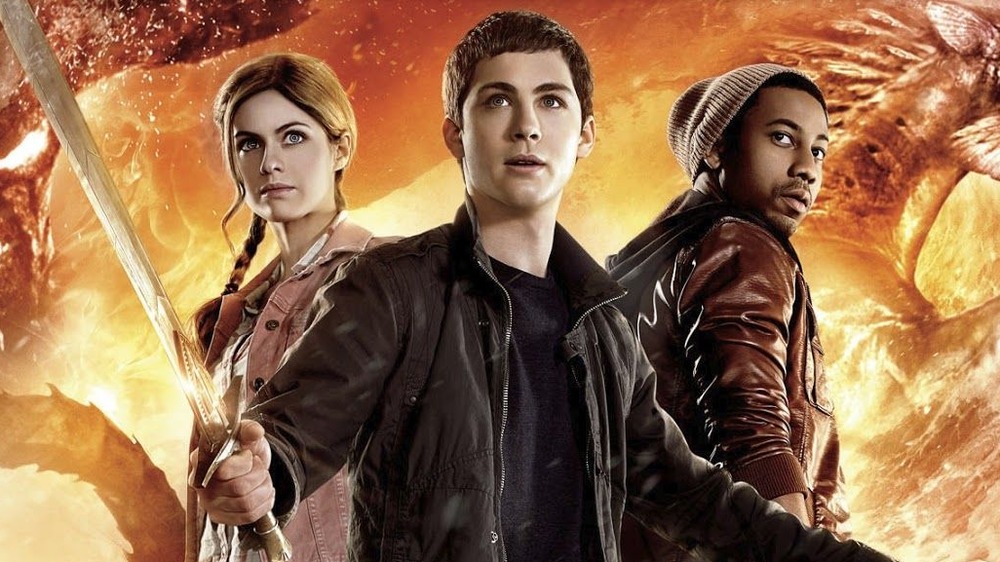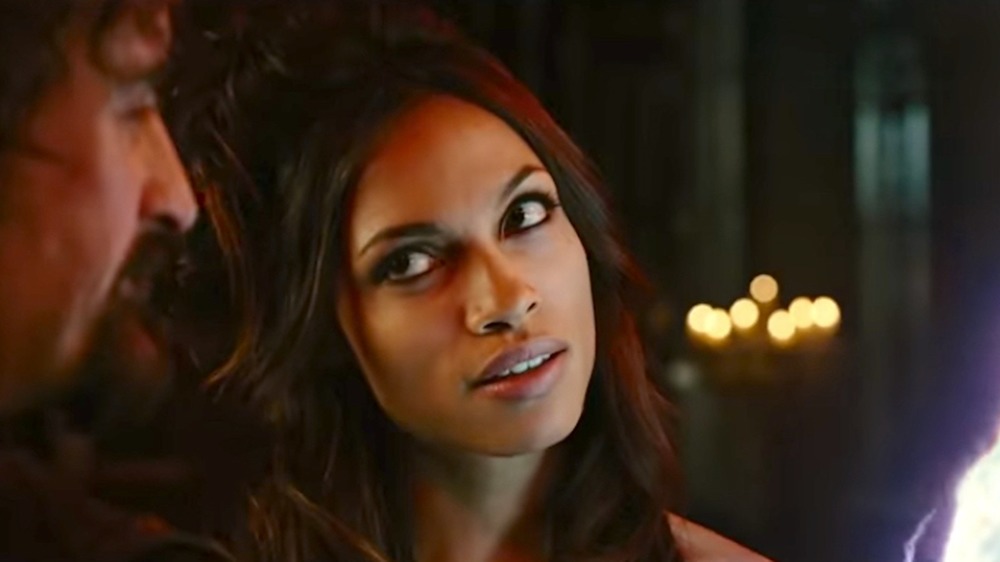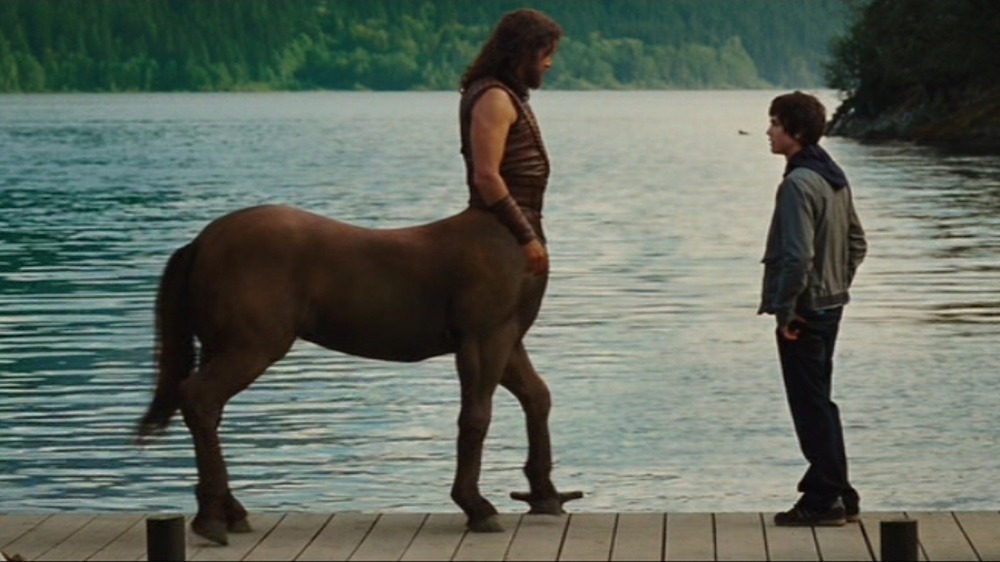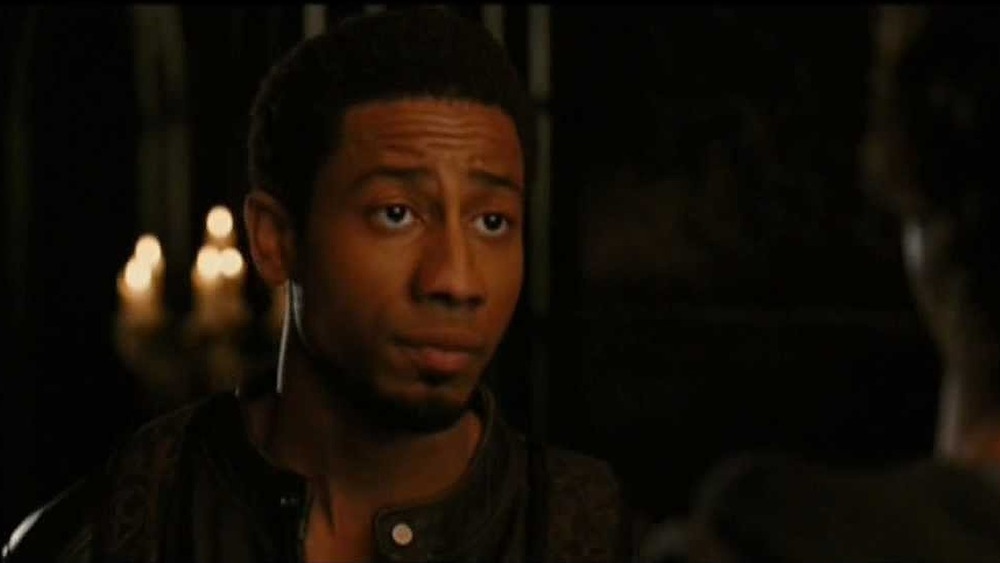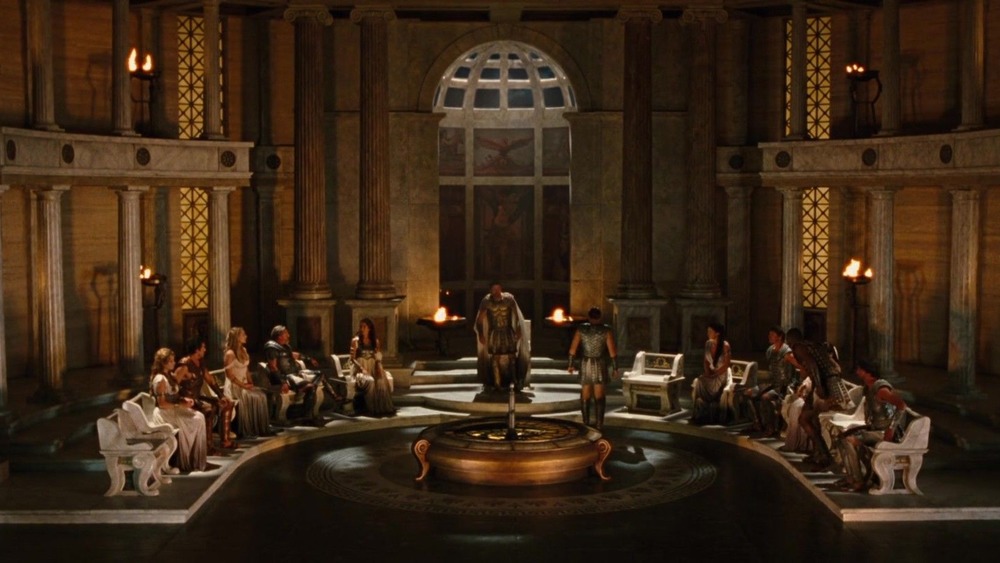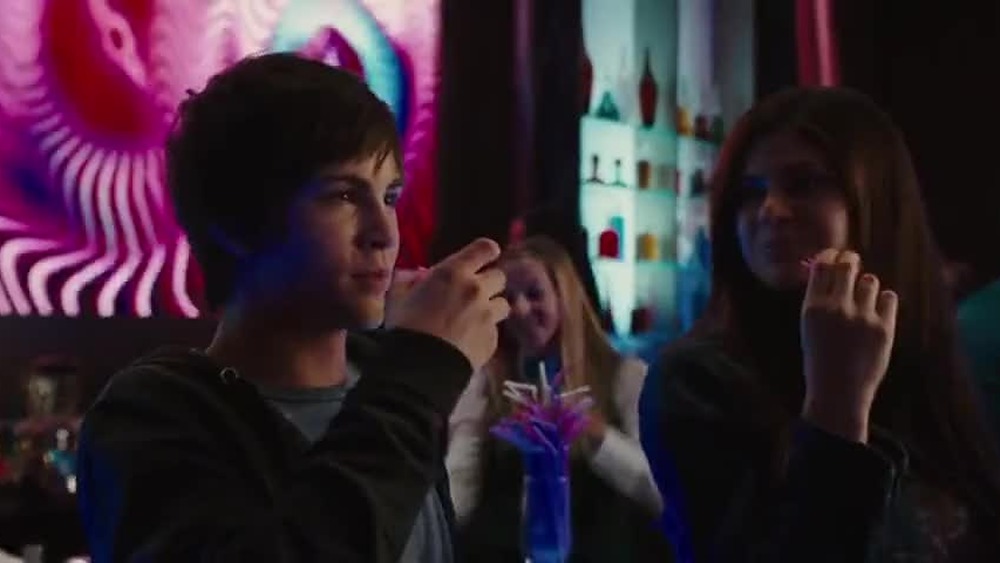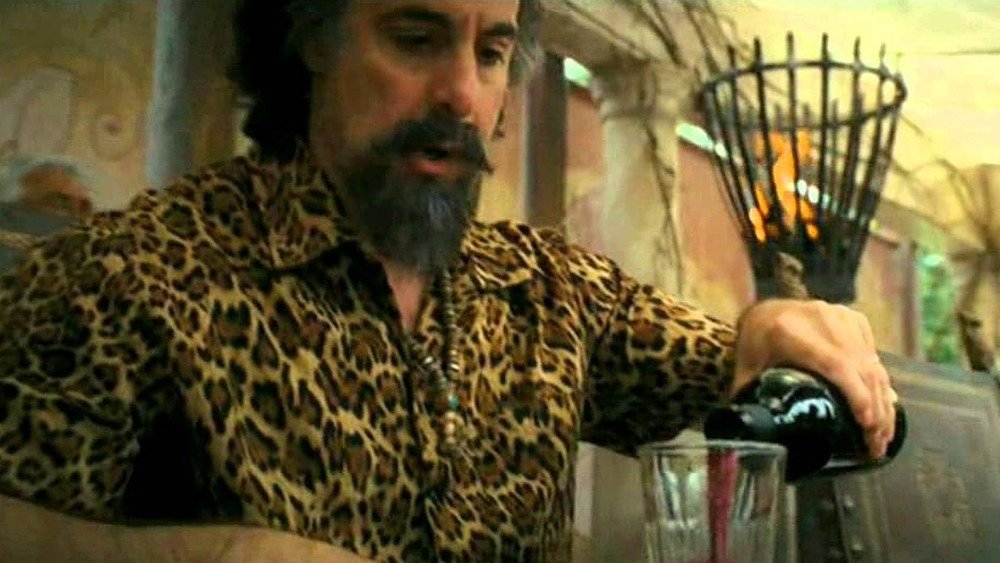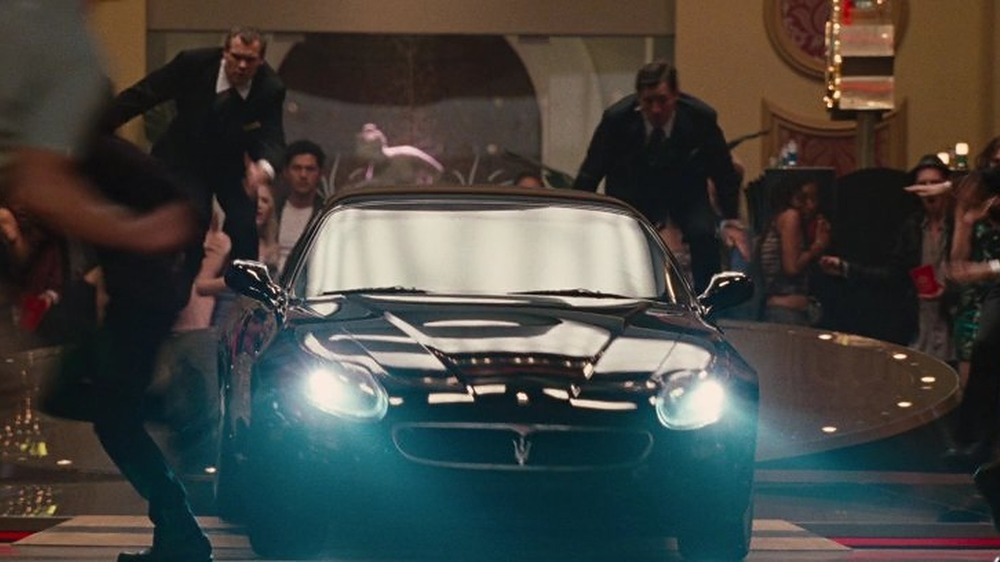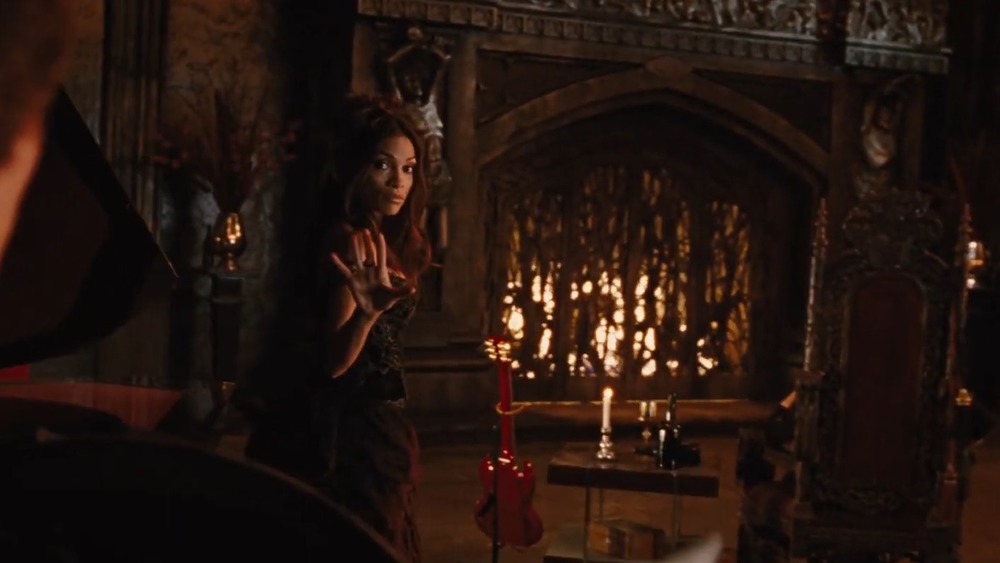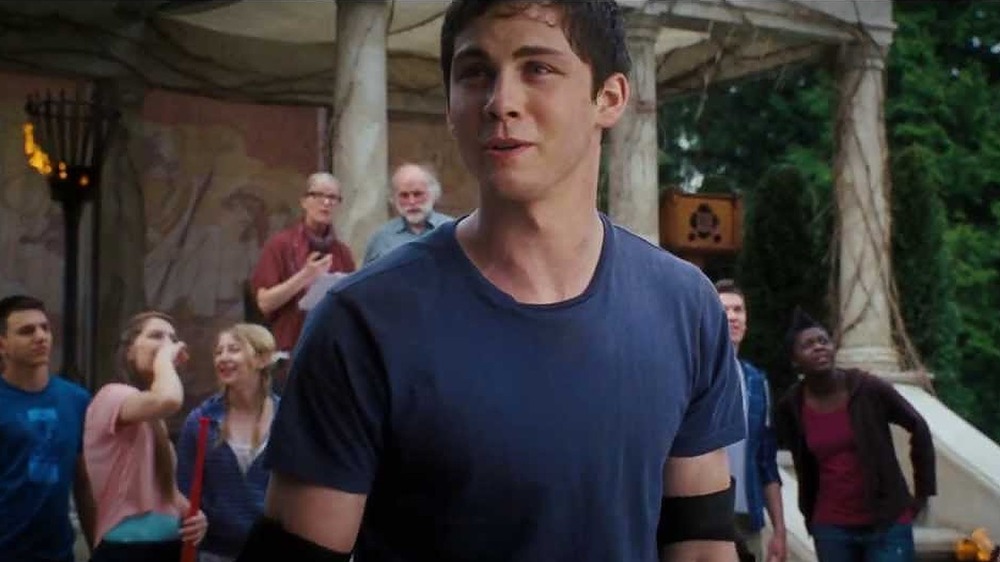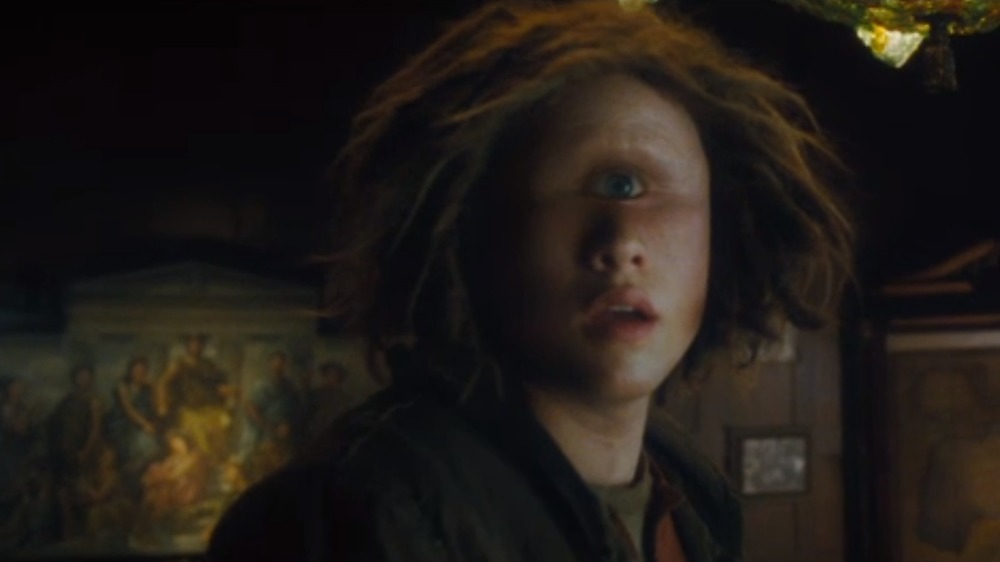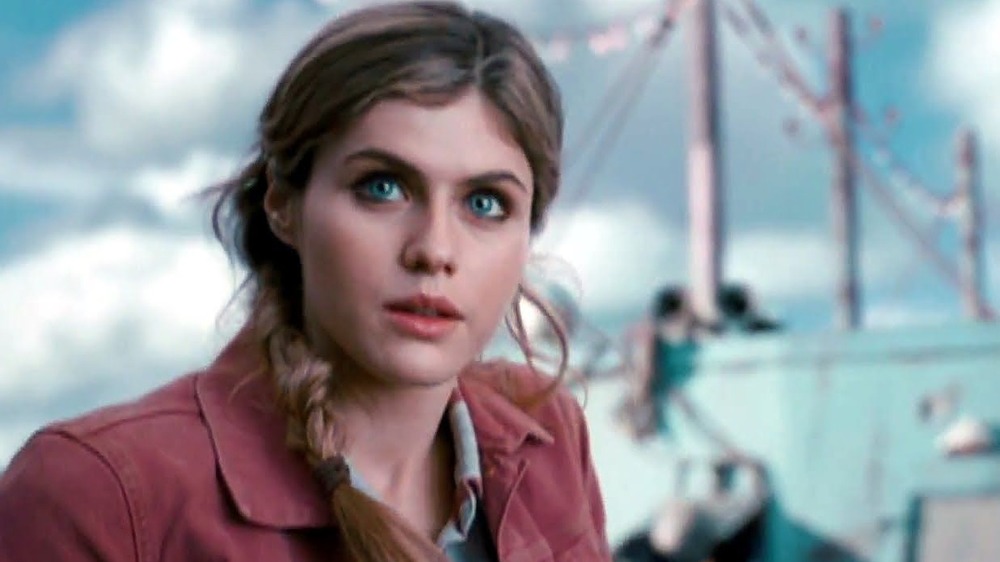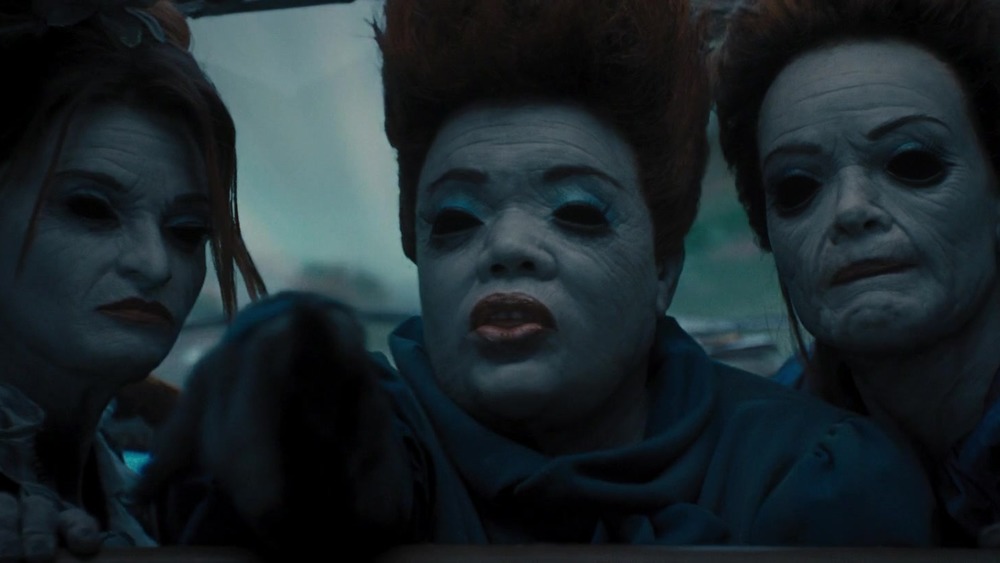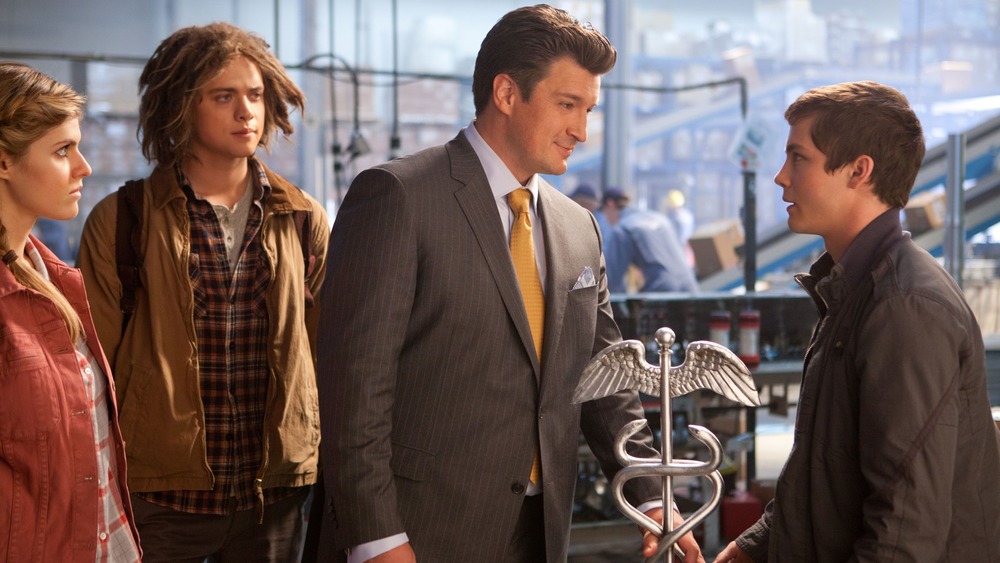Things Only Adults Notice In The Percy Jackson Movies
Based on the popular fantasy novels by Rick Riordan, the Percy Jackson and the Olympians franchise takes place in a world of Greek gods and ancient monsters. But despite its classical roots, both the books and the films are meant for younger audiences. After all, in the novels, the characters start out at 12 years old, and in the films, Percy begins his adventures at age 16. In other words, it's the perfect adventure story for kids.
However, if you haven't seen the movies in a long time, you might not remember that there's a surprising amount of content in both 2010's The Lightning Thief and 2013's Sea of Monsters that appeals to a much wider audience. And we're not just talking tweens and teens. From mythological mistakes to surprising musical references, here are the things in the Percy Jackson movies that only adults would find unobscured by the Mist.
Percy Jackson's big Persephone problem
For a movie based entirely around Greek mythology, The Lightning Thief doesn't always pay as much attention to its source material as it should. We could forgive a few approximations and omissions here and there, but there's one glaring inconsistency that undermines the entire plot of the film.
Persephone shouldn't have even been in the Underworld when Percy and his friends arrived there around the summer solstice. According to her own mythology, she's forced to remain in her husband's domain during the winter months. In the spring and summer months, she brings mild weather to the Earth above. In fact, the entire quest for the pearls, which takes up the bulk of the film, is inspired by Persephone's captivity in the Underworld, as the pearls belong to her and allow the user to travel to and from Hell. The movie references her imprisonment frequently but neglects to portray it accurately.
It might not have been so big of an issue if it wasn't Persephone who ended up securing the gang's escape from the Underworld by knocking out her own husband. In reality, she wouldn't have even been there, and they would've had a much harder time getting out.
The films feature quite a bit of disability representation
While the movies are controversial among fans of the books, we've got to give the Percy Jackson films props for showcasing quite a bit of disability representation. In fact, characteristics we'd associate with disabilities are some of the primary identifiers that mark a demigod.
Percy has been told that he suffers from ADHD and dyslexia because his brain is hardwired for a drastically different world than the high school landscape of required reading and standardized tests, making it seem like he has dysfunctions in a place he wasn't made for. The "impulsivity" attributed to ADHD is actually a manifestation of his combat reflexes, and the confusion that arises when he tries to read English results from his natural predisposition toward reading a notoriously difficult language.
Grover and Chiron both have physical disabilities in their disguised human forms, as well, and these two mask underlying strengths and unique abilities. Chiron's wheelchair is a camouflaging vessel for the magnificent horse portion of his centaur body, and Grover's crutches allow him to mask the fact that he, as a satyr, has goat legs that serve him well as Percy's protector.
Percy's entire introduction to the demigod world is based around the ideas that there's more to life than meets the eye and that there's a profound strength of character hiding in anyone. Percy himself learns not to underestimate Grover, Chiron, or himself — a powerful message for the disabled community that adults should point out to their children, students, and siblings.
Demigod discourse
When it comes to being sensitive to individuals of diverse backgrounds, the terminology that Percy learns to apply to the demigod world deals with similar issues to that of human discourse. He learns the proper way of addressing and referring to certain "demi-graphics," so to speak, with the help of his best friend and guide, Grover, a satyr. Apparently, "protector" duties include making sure your charge doesn't say anything that will get him into trouble, which makes sense when the wrath of mythical creatures is involved.
It's also just something that good friends do for each other — hold each other accountable for using oppressive or offensive language. One of the first suggestions that Grover offers relates to his own identity, when he informs Percy that the "politically correct" term for a half-man, half-goat is a satyr. (Percy has just insensitively, though not maliciously, called him a "weird hybrid man-goat thing," so the correction is warranted.)
Grover apprises his friend of the proper language in multiple scenarios. For example, the preferred way to refer to a cyclops, we learn, is "ocularly challenged." These comments might go right over a child's head, and when adults pick up on them, it's important to frame them as supportive toward groups of people pursuing their desired nomenclature.
Like father, like son
In the Percy Jackson franchise, we meet the children of various gods, and these immortal progeny share similar characteristic with their classical parents — traits that younger audiences might not be familiar with. For example, Clarisse — an antagonist turned ally of Percy's in Sea of Monsters – is a daughter of Ares, which is part of where she gets the aggression and competitive spirit that initially makes her such a bitter rival.
Ares' children are pretty formidable in general. In The Lightning Thief, during the infamous game of "capture the flag" where the son of Poseidon first proves his mettle, Luke Castellan warns Percy, "Sons of Ares, watch out," alluding to the offspring of the god of war and their inherently violent nature.
The daughters of Aphrodite, the goddess of love, have also clearly inherited some personality traits from their mother. Living together in the house under her name, they behave like a sorority (known on college campuses as "Greek life"), spending their time tanning, flirting, and throwing parties. Allusions like this to the personality traits of the gods are a little more subtle than, say, the son of Poseidon being able to heal himself with water.
The way the cookie crumbles
Something odd is going on at the Lotus Casino in Las Vegas, but only older viewers would understand the true nature of the lotus flower cookies that Percy and his friends can't seem to get enough of. These addictive, brightly colored sweets represent something much darker. The way the teenagers behave after consuming them and the effects they have on the user's mood, intellect, and the passage of time render them a clear reference to party drugs and narcotics.
The delicacies take their inspiration from the myth of the Lotus-Eaters, which describes a tribe of people encountered by Odysseus on his famous quest, people who offered the hero and his crew a mysterious plant that caused them to drift into a state of mindless bliss outside of time. This is certainly what happens to Percy, Annabeth, and Grover in Las Vegas, a city synonymous with indulgence and excess.
The fact that the mysterious flowers cause the users to waste years of their lives without realizing it is representative of the course of addiction. The friends completely forget about the most important thing in their lives in their blind escapism, and it's only through mutual support that they manage to break the spell.
Percy Jackson's Biblical reference
Mr. D — as the attendees at Camp Half-Blood call the god of wine, madness, and parties — is the newly appointed camp director in Sea of Monsters. This position comes as part of a punishment Zeus whipped up to get back at his son for going against the bro code (though it's really a father-son code, in this case) and pursuing a dryad Zeus had a fancy for. But the worst of Dionysus' punishment was the fact that every time he attempted to pour himself a glass of wine, it turned into water in his cup.
Not only can he not drink any wine, he can't use his powers to grow grapes for wine, either. In the books, it's hinted that a prior period of punishment caused the Prohibition era, which is a decidedly adult allusion. Despite the fact that he can't get drunk, Dionysus seems pretty belligerent and self-important in the film, constantly calling Percy by the wrong name.
But this type of gaffe may be more a part of his personality than a side effect of alcohol. (Or perhaps his withdrawal is making his brain foggy!) After all, Dionysus does seem to have a wit as dry as a fine red wine. In response to his curse, he comments that Christians have a guy who can do that trick in reverse, a reference to Jesus turning water into wine in the Bible.
Vehicles of symbolism
As you might expect, the Percy Jackson movies contain quite a few nods to elements of human and godly realms, but they're more likely to be picked out by older audiences. After all, the kids watching won't be as likely to recognize the Maserati in which Percy and his friends escape from the Lotus Casino. And they probably won't know that the trident logo for the luxury car brand was, in fact, based on Percy's father — or at least his Roman counterpart, Neptune, and the fountain dedicated to his likeness in the company's home city of Bologna, Italy.
Another motor vehicle from The Lightning Thief carries its own special significance. When the heroes get off their bus amidst the sounds of AC/DC's "Highway to Hell," the front of the bus indicates that it's bound for Atlantic City. As you may know, Atlantic City has a hellish reputation among many adults, which has been used as joke fodder in numerous sitcoms and, apparently, this young adult film.
Percy Jackson's reference to classic rock
The camera tracks quickly to close in on the suave ruler of the Underworld, so quickly that we almost miss it, but eagle-eyed fans have pointed out that Hades can be seen in possession of a Gibson SG guitar when we first meet him in his palace.
This bright red axe is the same type of guitar as Angus Young's, the lead guitarist of AC/DC. One of the band's most famous songs is "Highway to Hell," which for Hades would simply be the highway home. The god's persona in the film rocks pretty hard, as well, from the unruly curls and goatee to the leather bracelet and aesthetically ripped black sleeves.
Even more fittingly, the logo of the iconic rock band features a lightning bolt where the forward slash would be. Zeus' lightning bolt is exactly the godly object that Percy has been accused of stealing in The Lightning Thief, and this allegation is the reason they have to travel down the literal highway to Hell in the first place.
Dealing with impostor syndrome
If The Lightning Thief did a good job with disability representation, Sea of Monsters built on that legacy by showcasing the classic difficulty of the coming-of-age experience and the insidious nature of impostor syndrome. That's when the sufferer believes that they're inadequate and experiences exaggerated doubt about their achievements despite evidence of success.
Percy actually says out loud that he sometimes doesn't believe he actually did the things he was praised for. To not only doubt the merit of your achievements but to seriously question whether they happened at all suggests a very severe case of impostor syndrome, but it's also not unheard of! It's actually a documented symptom of the ailment in those who suffer from it, and for Percy to say it in such clear terms is, in a way, comforting to such people, who are often objectively high achievers. Being the son of a god who literally saved the world places Percy firmly in that category.
The side effects of the Mist
The Mist is a magical force that prevents mortals (and sometimes demigods, if it's strong enough) from seeing gods, monsters, and other supernatural entities by disguising them as something from the mortal world. For example, such magic is at work disguising Chiron's centaur body as a wheelchair.
In order to allow him to travel seamlessly with the group of demigods in Sea of Monsters, Annabeth procures a spray bottle of Mist that artificially disguises Tyson (making him look like a human with two eyes rather than a cyclops). Hilariously, the side effects listed on the bottle are a joke at the expense of medication commercials that spout off a slew of side effects that are sometimes so contradictory that they do the opposite of what the medicine itself is supposed to do.
We've seen commercials for antidepressants that may make depression worse or asthma medications with respiratory side effects. Side effects of the Mist seem much more pleasant in general, and they include handsomeness, high self-esteem, and low self-esteem.
Characters deal with discrimination in the Percy Jackson movies
Sea of Monsters builds upon the deep discussion of its predecessor by exploring Annabeth's prejudice against cyclopes. Over the course of the film, Annabeth makes her animosity toward Percy's half-brother, Tyson — as well as cyclopes in general — very apparent. However, we don't really learn why until later in the story when she opens up about how it was a cyclops who took the life of her friend, Thalia, years ago.
To complicate matters further, one of the biggest obstacles in the film's storyline is yet another cyclops, from whom they must rescue Grover, as well as the magical Golden Fleece. The circumstances make it very easy for Annabeth to cling to her personal prejudice, given that the cyclopean threat to their mission only serves to reinforce it.
Despite this, however, Annabeth undergoes a personal journey in tandem with the physical one, a transformation that holds a lesson for viewers of all ages. She gradually learns to dismantle her discriminatory paradigms and behaviors against cyclopes, finally acknowledging that it's destructive to make assumptions about and harbor aggression toward an entire group of people.
The Gray Sisters provide some pretty funny jokes
The Gray Sisters (aka the Graeae) — Anger, Wasp, and Tempest — make their first appearance in Sea of Monsters, sharing only one eye between them. This deficiency automatically makes the trio an ideal slapstick choice to drive a supernatural taxicab.
As a result, we got a lot of inside jokes and references thanks to these siblings. For example, Annabeth announces their vessel as a Chariot of Damnation, prompting Grover to reply that it looks like a New York City cab. Annabeth retorts, "Same difference," which is sure to get a chuckle out of any adult who's taken a less-than-stellar cab ride.
The sisters also bemoan a familiar mortal woe — that of a terrible driver's license picture. But while our unflattering photos typically amount to a washed-out face or an awkward blink, the crime committed by the Graeae's portrait is much more offensive. It makes them look like they don't have eyes, which is just plain untrue. "We do so have an eye," they protest. Just one.
And if you look closely with your own eyes, however many you have, it also looks like, from the suspiciously serpentine hair, the bobblehead on the dashboard is a likeness of Medusa. In mythology, the Graeae are the ones who give the hero Perseus the information he needs to kill Medusa ... by beheading her. Or as one might say, by turning her into a real-life bobblehead.
Getting the message
The lesser-known but fascinating god Hermes works for the United States Postal Service. That's pretty fitting for the "herald of the gods," who worked as a messenger and courier for Mount Olympus and was also the bringer of good luck and god of wealth, trade, travel, and language. (Oh, and thieves, but that doesn't relate as much to the postal service.) And the portrayal by Nathan Fillion in Sea of Monsters captures a subtle blend of matter-of-factness and mischief that only the deftest of gods could pull off.
As the god of a number of ubiquitous things, it's fitting that so many of Hermes' artifacts show up as widely used symbols even today. We can recognize his winged feet in the Goodyear logo, as the company thought that the god Mercury (the Roman version of Hermes) held many of the qualities they wanted their company to be known for. And honestly, the god of trade and commerce was a great choice to represent the tire company. Hermes' staff is also widely used as a symbol in the United States, representing medicine, which is definitely a field in which we want the bringer of good luck on our side.
